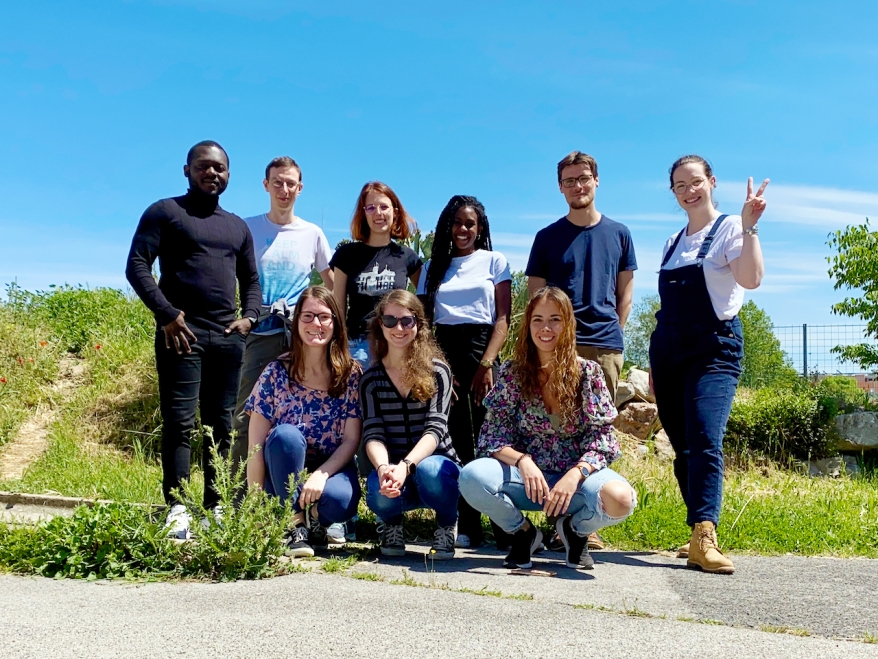Photo legend: The CJC board, May 1st 2022. L—R, standing: Epiphane Kolla, Lionel Kusch, Julie Crabot, Sarah Dandou, Antonin Marquant, Solène Laville. L—R, kneeling: Magali Weissgerber, Pauline Bennet, Alba de Juan.
As a pan-European network, Eurodoc is constantly exploring what challenges early career researchers face in different countries and how we as an organization can better help address them. This text marks the beginning of an article series on the Eurodoc members (National Associations and observers) that advocate for positive changes in the policies, culture, training, well-being, and employment conditions of ECRs in 26 European countries.
Taking the opportunity, we would like to congratulate (belatedly) our French NA — Confederation of Young Researchers — and all the French people on Fête nationale française, which they celebrated last week!
In your opinion, what are the main challenges for early career researchers in your country?
According to the French Ministry of Higher Education, 25% of PhD candidates do not benefit from a doctoral contract and about 10% of them are not funded at all. A significant part of them have poor working conditions (no office, professional isolation), especially in literature and social sciences. Generally speaking, the quantitative evaluation of research and the “publish or perish” culture puts high pressure on early-career researchers in France and cascades into a poor work-life balance.
The career opportunities are scarce and competitive in the academic world. Post-doctoral researchers are hopping between short-term contracts, sometimes with the particularly precarious status of “vacataire” (some kind of French to avoid repeating “precarious” twice, another word would be better here. Still thinking of which similarity can best replace “precarious” adjunct professor), with few opportunities of long-term contracts or tenure.
All of this is leading to a global deterioration of the mental health of many early-career researchers, which should be addressed as a serious public health problem.
Recent developments on the situation of early-career researchers in France stem from the Research Programming Law voted in 2020, progressively enforced with the ongoing publication of decrees specifying the conditions of implementation. We are concerned about several points. For instance, there will be an increase in the number of contractualized PhD candidates but this will clearly be insufficient for all new PhD candidates to be financed. A new decree created a PhD doctoral contract fully falling under private law, currently offering neither any guarantee of a correct balance between research activities and work for the company, nor ensuring that no conflict of interest might exist. New types of research contracts have also been created, reinventing ways to maintain early-career researchers under precarious conditions (e.g. expensive tenure tracks that did not previously exist in France).
How does your NA address those challenges?
The CJC has been active in the debate during the writing of the law and is in continuous communication with the government working on the implementing decrees. We participate in meetings with the Ministry of Higher Education, Research and Innovation, and meetings with other associations, representatives and labour unions related to research.
We also assert our position on social networks, in interviews in the newspapers, and we sometimes publish a press release to communicate on a hot topic. Our communication sometimes targets recent legislative developments, dysfunctions reported to us by researchers, and generally aims at raising awareness on the working conditions of early-career researchers.
The CJC is currently setting up a network of PhD representatives in doctoral schools. The objective is to inform them on the rights of PhD candidates and provide them with guidelines to help those in distress. Representatives will be encouraged to share their experience, as the tasks of representatives often differ between academic institutions. This could provide a comprehensive overview of how much leeway representatives have to influence some decision-making authorities when it comes to PhD candidates.
On a weekly basis, the CJC receives many emails from early-career researchers in difficulty, some facing very precarious situations or harassment and seeking advice on their means of action. An important part of our work consists of answering them the best we can.
How does the cooperation with Eurodoc help in solving these challenges and what else can be done?
Eurodoc is helping the CJC in multiple ways, deeply linked to the European perspective it gives us. Indeed, we are in contact with early-career researchers from many countries thanks to Eurodoc and it keeps us up-to-date with events related to European research. Being aware of the situation in other countries helps us challenge our national vision of what a PhD programme should be (e.g. duration of the PhD, content of training programmes, healthy relationship to the supervisors). It enables us to compare policies, such as the way the COVID-19 pandemic was dealt with in other countries. We are inspired by the work of other national associations which we may try to reproduce, such as surveys sent to early-career researchers. At last but not least, the lobbying of Eurodoc at the European level, of course, participates in addressing issues that matter to our association.
Learn more about the Confederation of Young Researchers (France) and their work:

